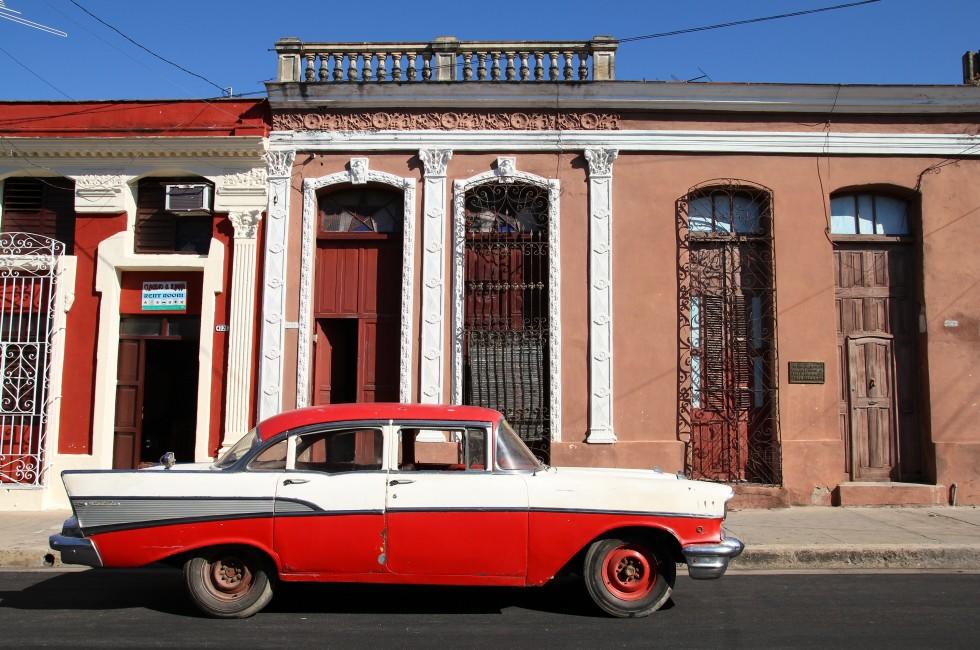Central Cuba
Central Cuba
Cuba's geographic heart beats with the rhythms of Afro-Cuban music, of turquoise waves crashing on white-sand beaches, and of life unfolding in splendid colonial cities. Its coral reefs are awash in color, its mangrove swamps attract flamingos by the thousands, and its lush mountain valleys are filled with birdsong of all types.
Inviting beaches border Central Cuba to the north and south. In between are varied landscapes—from mountains to mangroves—dotted with historic cities. Unlike that of many Caribbean islands, Cuba's early history centered on life in cities, and scattered across this region are three of the nation's seven original "villas"—Trinidad, Sancti Spíritus, and Camagüey—as well as the colonial town of Remedios. In each, time-worn churches and mansions line cobbled st...
Read MoreCuba's geographic heart beats with the rhythms of Afro-Cuban music, of turquoise waves crashing on white-sand beaches, and of life unfolding in splendid colonial cities. Its coral reefs are awash in color, its mangrove swamps attract flamingos by the thousands, and its lush mountain valleys are filled with birdsong of all types.
Inviting beaches border Central Cuba to the north and south. In between are varied landscapes—from mountains to mangroves—dotted with historic cities. Unlike that of many Caribbean islands, Cuba's early history centered on life in cities, and scattered across this region are three of the nation's seven original "villas"—Trinidad, Sancti Spíritus, and Camagüey—as well as the colonial town of Remedios. In each, time-worn churches and mansions line cobbled streets and tidy parks; in the verdant countryside beyond, old farmhouses overlook sugar plantations, royal palms tower over pastures populated by the people's cattle, and children in red-and-white uniforms play outside one-room schoolhouses.
Central Cuba's northern and southern coasts have many beautiful stretches of sand. The beach count leaps dramatically when you include the hundreds of cayos (keys) that flank the shores. More and more visitors are discovering the northern cayos, collectively called the Jardines del Rey (Gardens of the King). In the south, the less accessible archipelago known as the Jardines de la Reina (Gardens of the Queen) is visited only by diving excursions.
Recommended Fodor’s Video
Hotels
Things to Do
Things to Do
Explore Things to Do
Find the perfect tours and activities in Central Cuba.
Where to Eat
Where to Eat
Need to Know
Need to Know
Language
SpanishElectrical Outlets
110v/60 cycles; electrical plugs have two flat prongs (the same as in the U.S.).Currency
Cuban Peso (CUP) and Cuban Convertible Peso (CUC)Language
SpanishElectrical Outlets
110v/60 cycles; electrical plugs have two flat prongs (the same as in the U.S.).Currency
Cuban Peso (CUP) and Cuban Convertible Peso (CUC)When to Go
Hurricane season runs from May to November, with September through November presenting a greater risk of your vacation being washed out. The...Read More
Neighborhood Guides
Discover the best neighborhoods in Central Cuba with curated recommendations from our editors.
essentials
transportation
When to Go
Hurricane season runs from May to November, with September through November presenting a greater risk of your vacation being washed out. The...Read More
Neighborhood Guides
Discover the best neighborhoods in Central Cuba with curated recommendations from our editors.
When to Go
Hurricane season runs from May to November, with September through November presenting a greater risk of your vacation being washed out. The...Read More
Neighborhood Guides
Discover the best neighborhoods in Central Cuba with curated recommendations from our editors.










